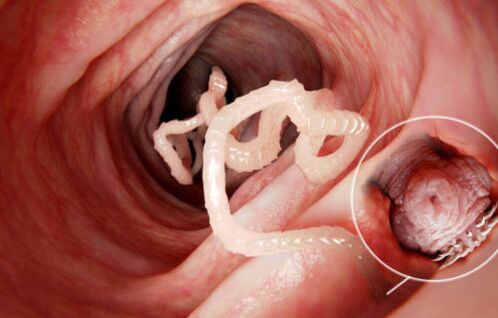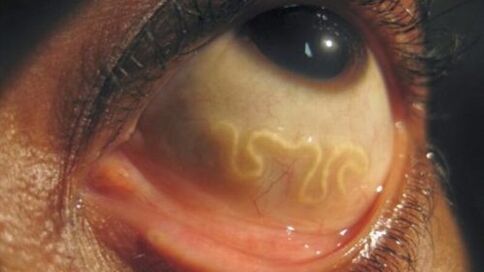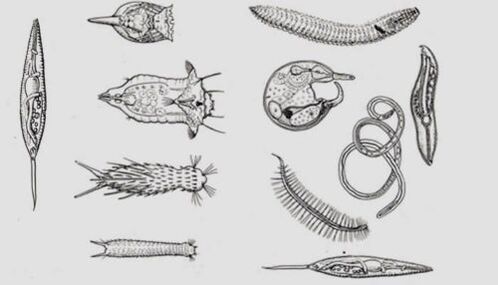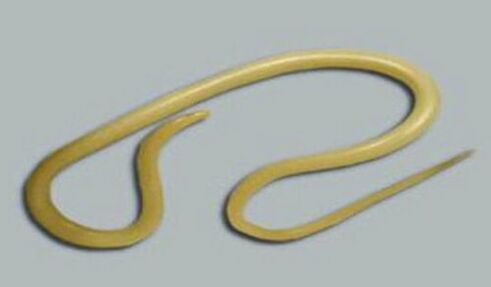It has long been known that almost all organ diseases may be caused by the presence of internal parasites.

However, in the eyes of each of us, this will never happen to us. At the same time, hundreds of people go to different doctor's offices every day, but they can't find the cause of their illness.
How do parasites enter the human body?
Parasites enter human organs in many ways, and we always encounter each way in our daily lives.
How the parasite enters the body:
- When eating lightly salted fish or caviar.
- Spread the meat with lard.
- Use wild animal meat.
- With undercooked meat.
- Served with bacon and fish.
- The medicinal materials, vegetables and fruits were improperly washed before use, and they were not blanched with boiling water.
- When walking barefoot on the grass, in the fertilized place.
- From pets.
- Insects such as flies can carry eggs.

Signs of parasitic infection
After studying how parasites enter the human body, almost every inhabitant on the planet found themselves in a so-called dangerous zone.
However, there are certain symptoms, and the presence of these symptoms may mean that the parasite is present in the human body:
- Intestinal diseases.
- constipation. It is caused by the long-term existence of parasites in the human body and reaching large sizes, blocking the intestines, thereby hindering the stable operation of the body.
- diarrhea. Loose stools may also be a sign of internal parasites. The cause of diarrhea may be parasites, which secrete substances that are toxic to humans during their lifetime and, among other things, cause feces to liquefy.
- Flatulence. The cause of these diseases may be worms in the human body, which cause inflammatory processes in the course of life.
- Bowel disease. Parasites living in the human body absorb most of the beneficial nutrients from the body. In addition, worms that are parasitic in the human body can cause malfunctions in the coordination of the body. Therefore, for example, the organ stops properly absorbing fat, and as a result, the fat appears in the large intestine, and further appears in the stool, resulting in loss of control of the stool.
- Joint and muscle pain. Many times, these painful sensations are very similar to those experienced by arthritis patients. They are caused by the inflammatory process caused by the immune system trying to expel parasites from the body. This is the cause of the pain.
- allergy. The cause of dermatitis, papilloma, eczema and various skin rashes are often parasites that exist in the body for a long time. Allergies are a specific signal of a person. In the body, the immune system produces a large number of eosinophils to play a protective role, causing inflammation, which can cause problems in the human skin.
- anemia. This disease caused by severe blood loss may also be the result of the "activity" of the parasite. Trichomonas living in the intestinal mucosa not only feed on body nutrition, but also on blood. This is why, during mass reproduction, this parasite in the infected person lives mainly in blood cells, causing a lot of blood loss.
- Weight problems. Any metabolic failure may be caused by the important activities of the worm. They can either disrupt metabolism and cause weight loss, or cause overweight by consuming most of the glucose.
- Increase irritability and irritability. The life activities of uninvited guests in the human body cannot be ignored by the nervous system. The toxins released by many parasites also stimulate the nervous system. This can lead to depression and frequent stimulation.
- fatigue. Due to the existence of "gluttonous" worms, human lack of nutrition will lead to the interruption of the immune system, which leads to a lack of energy.
- insomnia. At night, mainly between two and three in the morning, the liver will try to remove toxins from the body, so the parasites can escape through the anus. This process can cause irritation and insomnia.
- Bruxism (brix teeth while sleeping). This symptom is very common in children. This phenomenon is caused by the nervous system's response to the toxic waste of worms living in children.
- Immune disorders. The presence of parasites in the body causes the body's immunity to decline, and it is devoted to fighting the invaders. At the same time, any infection can easily enter the weakened body.
- airline. There, they can irritate the bronchial tubes, causing a person to have a runny nose and cough, which can lead to increased body temperature and diseases such as asthma and pneumonia.
- Oncology. Parasites that live in human organs for a long time can cause serious damage to internal organs, causing inflammation and slowing down the work of the entire organism and leading to negative consequences.


diagnosis
In the 21st century, everything can be diagnosed, including the presence of parasites in the human body. Anyone can pass all the necessary tests and accurately determine the presence of flukes in the body.
Modern medical technology can determine whether an intruder exists in the body in many ways.
Diagnostic options:
- Stool analysis (must be repeated at least 3 times, but it is best to perform the analysis within a certain period of time).
- Enzyme-linked immunosorbent assay (ELISA).
- Immunoassay test (ELISA test).
- Serological research methods.
- Visceral ultrasound.
- Endoscopy.
- PCR diagnosis can determine whether there are parasites in the human body based on the study of DNA analysis.
It should be noted that the treatment of parasitic diseases should be strictly under the supervision of a doctor, who will prescribe a course of treatment. This type of disease and other diseases should not be treated alone.

Parasite classification
The following is a complete classification. This category is protozoal microorganisms. This category includes:
- Dysentery amoebiasis can cause diseases such as amoebiasis.
- Intestinal balanosis, causing balanosis.
- Leishmania (Leishmaniasis).
- Giardia (Giardiasis).
- Plasmodium falciparum (malaria).
- Toxoplasma gondii (toxoplasmosis).
- Trichomonas (trichomoniasis).
Worms (worms), including:
- Roundworms (ascariasis).
- Posterior testicular disease (opisthorchiasis).
- Pinworm disease (pinworm disease).
- Hookworm (hookworm).
- Schistosomiasis (schistosomiasis).
- Anisakidosis.
- Trichinella (Trichinellasis).
A type of ectoparasites (living on the surface of the body), including:
- Lice (head lice).
- Scabies (scabies).
- Acne mites (Demonic mites disease).

Types of parasites
In order to roughly imagine the scale of the life activities of parasites in the human body, let us take a closer look at some of them.
Toksokara-Initially this parasite reproduced and lived only in the organs of the dog's digestive system. However, recent studies have shown that there are now a large number of people, mainly pet owners, who are carriers of Toxoplasma.
Adult Toxoplasma worms living in adult organisms can reach up to 30 cm in length. Toxoplasma relies on eggs that infiltrate the dog's feces to reproduce.
The excrement of the quadruped falls into the ground and sand, where the Toxoplasma eggs can be stored for several years. From there, the parasite infiltrates a person through the soles of the shoes, the floor and the hands of children, which touch everything on the ground in the park where the dog is walked.
Once in the human body, the parasite can no longer reproduce further in the body, because the toxoplasma larvae matures and spreads through the blood vessels and internal organs, but does not protrude outside the body.
In order to diagnose the presence of this parasite in the human body, it is necessary to pass a biopsy and immunological test of the affected organ (usually the liver).
It is worth noting that if the toxoplasma enters the eyes, it can be removed! The symptoms of this parasite in the human body are similar to other parasites.
Roundworms are parasites that enter the human body along with unwashed vegetables and herbs, dirty hands, and dust, and can be carried by flies.
According to some reports, this parasite affects hundreds of millions of people every year.

Early roundworm infection can cause allergic reactions.
The length of the roundworm reaches 40 cm, and only one female releases about 200, 000 eggs per day. In addition, roundworms enter the human body in the form of eggs, grow into larvae, and then grow in the intestinal wall, enter the blood there, and then enter any organs, including the liver, heart, and brain.
Roundworms are very dangerous because during its life, it may eventually enter any organ, damage it and cause serious diseases. This parasite can successfully parasitize in human blood, so the infected person may suffer from anemia or anemia. The symptoms of this worm in the body are similar to most.
Roundworms can be diagnosed by at least 3 stool studies and larval immunological examinations.
Tapeworm is a parasite that can grow up to 10 meters in the human body. This worm can live in the human body for about 25 years. When eating raw fish, crayfish and caviar, tapeworms enter the body. It is worth noting that such a huge parasite in the body cannot be ignored by humans.
The signs of its existence are quite obvious, including active salivation, which mainly appears in the morning, anemia, fatigue, abdominal pain, vomiting, nausea, weakness, lethargy and lethargy.
One characteristic of tapeworms is that a part of the parasite is excreted from human feces in the usual way. Usually, this can help a person who is not paying attention to symptoms to diagnose the presence of parasites in the body without testing.
prevention
By following simple prevention basics, you can minimize the chance of uninvited guests appearing in you and your child.

Thorough washing of food is the key to successful prevention of parasites.
To prevent parasitic infections:
- Follow the basic rules of personal hygiene.
- Eliminate contact with stray animals.
- Keep children away from infected pets.
- Minimize contact between children and pets during walking.
- Wash your hands after outdoor activities and before each meal.
- Avoid eating while walking.
- Wash the apartment frequently.
- Eat only clean vegetables and fruits, then blanch them with boiling water.
- Only eating meat products after complete heat treatment is enough to prepare a safe meal.
- Drink only boiling water.
- In the presence of pets, take precautions at least once every six months.



































